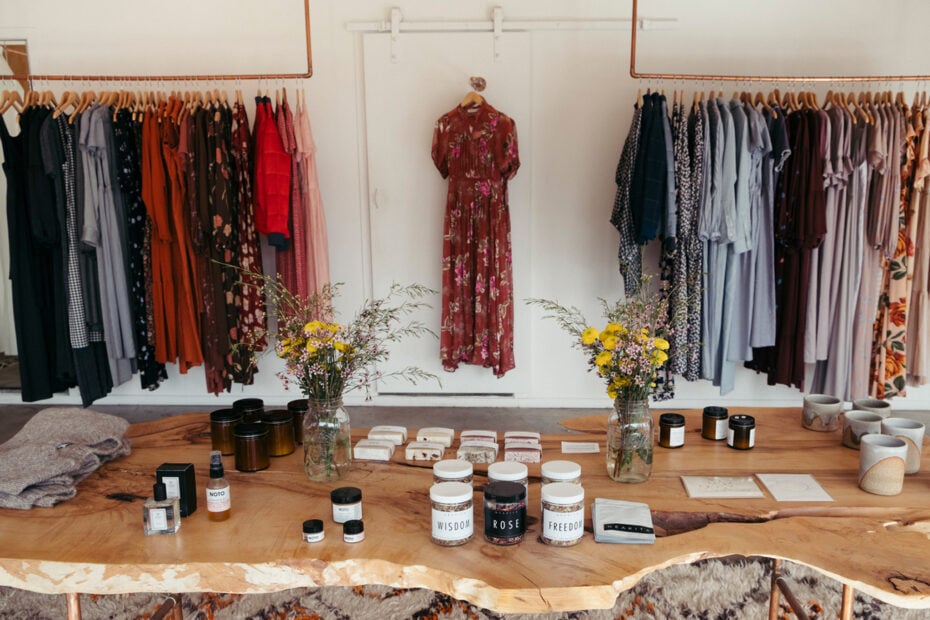7 Tips to Shop Ethically for Clothing
If you're starting your sustainable fashion journey, here are 7 tips on how to shop ethically for clothes to build a reliable wardrobe with pieces you can wear year after year.

1. Buy Secondhand
I've said it before, and I'll say it again. Buying secondhand is really my favourite way to shop. Not only is it the most sustainable option, it also saves money. I browse these apps for specific items. I also check my favourite local vintage and consignment stores every so often.
I especially like buying designer clothes and accessories secondhand because I feel less precious about keeping them spotless, thus I wear them more often.
Another good thing about buying second-hand is that it forces me to build a slow fashion wardrobe by default since I'm buying clothes that are from previous seasons. If last season's items are still holding up this season, they're likely to be timeless pieces.
2. Embrace Slow Fashion
I just read this New Yorker article about Reformation. Although this cool-girl brand is more eco-friendly than fast fashion brands, Reformation is still operating like one now that their production has scaled up, and now their quality has gone down.
It's still easy to fall into the trap of chasing trends even when shopping from so-called sustainable brands, especially when you see your favourite celebs and influencers promoting stuff that's "good for the environment."
Instead, I recommend only buying something if you see yourself wearing it in the years to come. Purchasing less clothing is better for the environment in general. It's also comforting to have tried-and-true staples to return to every season.
If you do want to have fun and play around with the latest in fashion—
3. Rent Clothes
I've rented clothes from Rent the Runway while visiting the States, and tried Dresst (Ontario-based, no longer in operation) for a few months. I personally don't rent right now because I'm satisfied with my wardrobe, but I recommend renting for those who require outfits for special occasions or like to be seen in new clothes for social or work events. Renting is also great for people who are still discovering their personal style.

4. Consider the Fabric
Before I buy a piece of clothing, I check the label for fabric and cleaning instructions. I want to avoid dry cleaning as much as possible, which is why I no longer purchase delicate silk items. I also don't like Viscose for this reason. Not to crap on Reformation even more, but a lot of their items are made from Viscose, and you have to dry clean them or else they shrink. They recommend green dry cleaning, but it's not easy to find truly eco-friendly dry cleaners. Even if there is one around your neighborhood, it's likely to be expensive.
Unpopular opinion here, but I'd rather get a dress made from a high-quality polyester (a synthetic petroleum-based fiber) than Viscose because it'll last me longer and I can throw it in the wash (in a Guppyfriend washing bag to catch microfibers) without having it wrinkle or shrink on me.
Ideally, I prefer natural, low-maintenance materials I can throw in the washer and dryer such as organic cotton and linen. For my cashmere, wool, and some silk pieces, I can hand wash...but who has the time to do this all the time? Going forward, I'm careful about purchasing new items that need to be hand washed.
So to recap, if an item is high maintenance, really think about whether it will fit into your lifestyle before purchasing.
5. Fashion Swap
Check local listings—Eventbrite, Facebook, Meetup, etc.—for upcoming fashion swaps. I've been to two and have emerged with some unique pieces. I also feel good knowing that my clothes have new homes instead of the possibility of them ending up in the landfill—which is something that can happen if you drop clothes in the donation bin.
Just make sure your clothes are clean and in good shape. I once found a nice dress that had all this cat hair on it. It smelled like a litter box too. Not cool. Needless to say, I did not take it home.
6. Buy Ethical Fashion as a Last Resort
If you must buy new clothes, do your best to support ethical brands and local designers.
Purchasing ethical fashion is not always accessible (although I have a guide for affordable ethical fashion). Not everyone can drop $400 for a new Dôen sweater. This is why I'm always recommending shopping secondhand. But if you do have the means or if you prefer to buy new items (like my friend who is a bit of a germ freak), definitely check out conscious brands. Many of them are doing really cool things.
7. Cut Yourself Some Slack!
Yes, our overconsumption of unsustainable clothing is a huge problem for the planet, but not everything can be made sustainably. Lingerie, for example, usually requires some synthetic fabric to be blended in to be stretchy.
I live in Toronto, a major city, and I still have difficulties finding certain ethical items. Bras, for example. It might be hard for you to find an ethical/sustainable alternative to x,y, or z where you live. If you buy a quality item from a brand whose production methods you're unfamiliar with, it's not the end of the world. If you're doing your best to reduce waste, don't beat yourself up. You're not the only one accountable for a greener planet. It's a collective responsibility.
In short: buy less and choose quality over quantity.